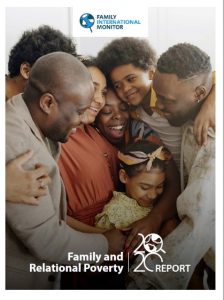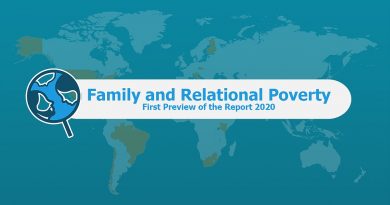Family and Relational Poverty: The First Report of the Family International Monitor
Family and poverty: this is the focus on which the Family International Monitor, set up by Cisf, John Paol II Institute and Ucam, has concentrated its attention in its first three years of activity, dividing the survey into two strands and examining first relational poverty and then economic-structural poverty.
“The intertwining of these two elements is a priority at the global level – explains Francesco Belletti, scientific director of the Family Monitor – as can also be seen by analyzing the 17 Objectives of Sustainable Development – Agenda 2030 of the United Nations”.
“The work of the Family International Monitor – Belletti continues – intends to highlight the role that family relationships play in qualifying people’s poverty status and promoting their resilience to difficult conditions, also paying particular attention to the systems of extended relationships around families, as well as the more macro-social dynamics such as community or neighborhood social ties, social cohesion and solidarity of short relationships”.
The survey used 90 indicators grouped into eight different thematic areas that could provide, in a homogeneous manner, a general statistical reference for each country, using the World Bank and the United Nations as priority sources. In each of the countries, a research center was also identified, which drew up a Country Report on the basis of a questionnaire, keeping in mind four aspects in particular: the family as an economic actor, as an educational subject, as a subject of care and reciprocity and as a subject of active citizenship.
In this context, family relationships make the difference, and their resistance or fragility generate very different outcomes. In particular, the data emerged with great clarity for families that are particularly vulnerable from the socio-economic point of view: here the strength of family relationships is a decisive factor in preventing them from falling below the poverty line. Lastly, the report reveals the great importance of extended relational networks, a fact that suggests that we should go beyond the consideration of the “nuclear family” as the sole defining framework. In particular, in the various contexts analyzed, intergenerational relations and the presence of significant non-parental relational networks such as neighbors, friendship, associations and solidarity are central.
On the opposite side, there emerges the presence of internal dynamics of strong inequality between stronger members to the detriment of weaker ones, generally in favor of adult males, to the detriment of women, minors and the elderly. This dynamic tends to be correlated with low levels of culture and social marginality. These dynamics of redistributive inequity can be contained and countered by redistributive public policies, such as legal protection of women in marriage and minors in the family. The survey data indicate that some family forms are structurally more fragile than others: among others, single-parent families, families with one or two teenage parents, and large families stand out. In some cases, these vulnerabilities could be better supported by targeted welfare interventions.
What emerges clearly from the survey is the need for public policies to act more effectively to counteract the strong conditions of socio-economic inequality, which have been found to be on the rise over the last twenty years in practically all the national contexts analyzed.







